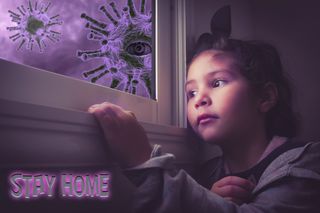Embarrassment
Dealing with Sorrow and Loss During Coronavirus
Buddhist psychology as a path toward healing.
Posted May 4, 2020 Reviewed by Lybi Ma

The coronavirus pandemic is upending our lives. There is understandable fear about how we’ll survive this crisis, not only financially, but also emotionally. But in addition to fear, there’s another emotion that might be even more challenging: Shame.
Losing our jobs and not knowing how we’ll support ourselves and our family is not only sad and scary; it can also be deeply shameful. When the pride we feel about our livelihood is disrupted, we can lose our sense of who we are.
According to Brene Brown, shame is the “intensely painful feeling or experience of believing that we are flawed.” Workshop leaders Bret Lyon and Sheila Rubin describe shame as an “embodied cognition.” As they put it in a recent workshop, “Shame is a combination of a primary, binding emotion with a state of freeze.” The belief that something is wrong with us is not just in our heads, it gets lodged in our bodies.
Embracing Difficulty
The First Noble Truth of the Buddha is that anguish, sorrow, and suffering are unavoidable features of our human existence. His formula for liberation from suffering might be seen as a psychological approach to life. Personal transformation begins by becoming mindful of our inner experience rather than clinging to conventional beliefs, rituals, or superstitions. Similar to modern psychotherapists, the Buddha encouraged us to face ourselves honestly.
Recognizing that human sorrow is a normal part of life can actually be very freeing. Saying this another way, our sorrows and dissatisfactions are nothing to be ashamed of. As Buddhist teacher and psychotherapist David Brazier writes in his brilliant book The Feeling Buddha, “The Buddha’s teaching starts with an assault upon the shame we feel about our suffering.” The way forward isn’t to obliterate our sorrows and dissatisfactions (an impossible task), but rather to engage with them in a way where they’re less likely to overwhelm us. This formulation is applicable to our current world situation.
Shame Sends Us Hiding
No doubt our life has been punctuated with many moments of emotional pain (rejection, loss, anxiety), which may have caused us to freeze up inside so that we don't have to feel it. A childhood marked by being shamed, abused, or traumatized might have been so overwhelming that we learned the dubious skill of dissociating from painful experiences to protect ourselves. We may have developed the habit of stuffing down or pushing away feelings that were overwhelming, and which represented a threat to our being accepted and loved.
Concluding that no one is interested in hearing our real feelings and needs, our authentic self goes into hiding. As psychologist Alice Miller explores in her classic book, The Drama of the Gifted Child, we’re conditioned to create a false self. We design a personality and a way of being in the world that maximizes the prospect of being accepted and minimizes the shame of being rejected.
To the extent that we live in a dissociative freeze state driven by fear and shame, we may attempt to “soldier on” as if our painful feelings don’t exist. We may turn to alcohol or other numbing addictions that distance us from our vulnerability. When shame disconnects us from our actual experience, our tender heart goes into hiding. Sadly, our capacity for tenderness, empathy, and intimacy diminishes.
Empathic Failure
One consequence of dissociating from our genuine feelings and needs is that we may judge and shame those who haven’t “accomplished” the task of disconnecting from their human vulnerability. Not having enjoyed a healthy, safe attachment with caregivers, where it was OK to be vulnerable and reveal our needs, we may have concluded that others should pull themselves up by their own bootstraps, just as we had to do. We may believe that everyone should take care of themselves.
If caregivers weren’t present in a consistently attentive, responsive way—validating our feelings, offering comfort, and attuning to us—we may have proudly concluded that such desires represent weakness; human vulnerability is something to outgrow—and something others should outgrow, too.
When enough members of society subscribe to shame-shaping beliefs that color how we experience the world, the cult of the individual bursts into full bloom. The attitude that we’re all on our own is deeply ingrained in Western society and many other nations.
This individualistic worldview may be seen as now bumping up against what is needed to defeat the coronavirus. The only way to stop the spread of this—and future— pandemics is by working together, being kind and considerate, and taking care of each other.
Shame Shapes Our Political Views
When we shame ourselves for having tender feelings, such as sadness, hurt, or fear, we’ve lost compassion for ourselves. This subtle violence toward ourselves leads to a lack of compassion toward others. Empathy grows in the muddy soil of embracing our experience as it is.
Sadly, this failure of empathy toward human suffering characterizes many of today’s political leaders, who are more motivated by power and acclaim than by compassionate service. A telltale sign of an underlying sense of powerlessness is the compensatory stance of bravado and arrogance. The refusal or inability to notice the shame that lives within them leads to shamelessly shaming and attacking others. People who show vulnerability or advocate for social policies that promote taking care of each other are judged as being pathetically weak, lazy, or unmotivated.
We’re currently in a situation where we need to take care of each other by staying at home as much as possible—and not hoarding toilet paper! Unless the fear of scarcity, the ethic of competition, and the strategy of divisiveness sown by many political leaders yield to a new ethic of cooperation and compassion, our world will continue to suffer unnecessarily. The coronavirus is dragging us—in many cases kicking and screaming—into the realization that we’re all in life together. Unfortunately, vital lessons are sometimes only learned the hard way.
Buddhist psychology teaches that inner peace and world peace begin by being friendly toward our experience as it is rather than having aversion toward it, which only creates more suffering. By engaging with the sorrows and dissatisfactions that are a part of human existence, we open our hearts to ourselves, which creates a foundation for having empathy and compassion toward others. More than ever, this is what our world now needs.
© John Amodeo
Pixabay image by enriquelopezgarre
References
Brazier, David (1997), The Feeling Buddha. New York: Palgrave.




